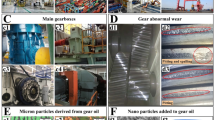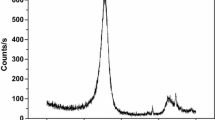Abstract
Bio-degradable lubricants are an attractive alternative for the mineral based and synthetic based lubricants. Bio-degradable lubricants are environmental-friendly and non-toxic. The present study deals with the tribological investigation of bio-degradable nano lubricants for worm gear applications. Nano additives like CuO and TiO2 were used. Bio-degradable oils like palm oil and sunflower oil were used as base oils. The nano lubricants were prepared by adding two nano additives and two bio-degradable oils each of 0.1 % and 0.2 % weight composition. Friction and wear characteristics were tested on pin-on-disc tribometer under varying load conditions. Extreme pressure tests for nano lubricants were carried out using four ball tester. The wear surface obtained was analyzed using scanning electron microscopy (SEM) and energy dispersive spectroscopy. From the tests conducted, it was found that the addition of nano additives in biodegradable oils reduced the friction co-efficient and wear rate to a considerable extent.
Similar content being viewed by others
References
G. Liu et al., Investigation of the mending effect and mechanism of copper nano-particles on a tribologically stressed surface, Tribology Letters, 17 (4) (2004) 961–966.
H. Ghaednia and R. L. Jackson, The effect of nanoparticles on the real area of contact, friction, and wear, Journal of Tribology, 135 (4) (2013) 041603.
P. Nagendramma and S. Kaul, Development of ecofriendly/biodegradable lubricants: An overview, Renewable and Sustainable Energy Reviews, 16 (1) (2012) 764–774.
M. Maleque, H. H. Masjuki and S. Sapuan, Vegetable-based biodegradable lubricating oil additives, Industrial Lubrication and Tribology, 55 (2003) 137–143.
P. S. Lathi and B. Mattiasson, Green approach for the preparation of biodegradable lubricant base stock from epoxidized vegetable oil, Applied Catalysis B: Environmental, 69 (3-4) (2007) 207–212.
P. M. Keshtiban, S. S. G. Ghaleh and V. Alimirzaloo, Lubrication efficiency of vegetable oil nano-lubricants and solid powder lubricants, Proceedings of the Institution of Mechanical Engineers, Part L: Journal of Materials: Design and Applications (2018) 1464420718754357.
J. K. Mannekote and S. V. Kailas, The effect of oxidation on the tribological performance of few vegetable oils, Journal of Materials Research and Technology, 1 (2) (2012) 91–95.
Q. Xue, W. Liu and Z. Zhang, Friction and wear properties of a surface-modified TiO2 nanoparticle as an additive in liquid paraffin, Wear, 213 (1-2) (1997) 29–32.
P. Nallasamy, N. Saravanakumar, S. Nagendran, E. M. Suriya and D. Yashwant, Tribological investigations on MoS2-based nanolubricant for machine tool slideways, Proceedings of the Institution of Mechanical Engineers, Part J: Journal of Engineering Tribology, 229 (5) (2015) 559–567.
H. Ghaednia, R. L. Jackson and J. M. Khodadadi, Experimental analysis of stable CuO nanoparticle enhanced lubricants, Journal of Experimental Nanoscience, 10 (1) (2015) 1–18.
Y. Y. Wu, W. C. Tsui and T. C. Liu, Experimental analysis of tribological properties of lubricating oils with nanoparticle additives, Wear, 262 (7-8) (2007) 819–825.
S. M. Alves et al., Tribological behavior of vegetable oil-based lubricants with nanoparticles of oxides in boundary lubrication conditions, Tribology International, 65 (2013) 28–36.
A. Kashyap and A. P. Harsha, Tribological studies on chemically modified rapeseed oil with CuO and CeO2 nanoparticles, Proceedings of the Institution of Mechanical Engineers, Part J: Journal of Engineering Tribology, 230 (12) (2016) 1562–1571.
L. Pena-Paras et al., Effect of CuO and Al2O3 nanoparticle additives on the tribological behavior of fully formulated oils, Wear, 332 (2015) 1256–1261.
F. Ilie and C. Covaliu, Tribological properties of the lubricant containing titanium dioxide nanoparticles as an additive, Lubricants, 4 (2) (2016) 12.
K. Yathish and K. G. Binu, Static characteristics of two-axial groove journal bearing operating on TiO2 nanolubricant using a temperature dependent viscosity model, Journal of Mechanical Engineering and Automation, 7 (5) (2017) 150–154.
M. Z. Shaari et al., Investigation of tribological properties of palm oil biolubricant modified nanoparticles, Jurnal Teknologi, 76 (9) (2015) 69–73.
H. L. Yu, Y. Xu, P. J. Shi, B. S. Xu, X. L. Wang, Q. Liu and H. M. Wang, Characterization and nano-mechanical properties of tribofilms using Cu nanoparticles as additives, Surface and Coatings Technology, 203 (1-2) (2008) 28–34.
I. Gawrilow, Vegetable oil usage in lubricants, Inform, 15 (11) (2004) 702–705.
ASTM Standard D2783-03, Standard test method for measurement of extreme-pressure properties of lubricating fluids (four-ball method), West Conshohocken, PA: ASTM International (2009).
L. A. Quinchia et al., Tribological studies of potential vegetable oil-based lubricants containing environmentally friendly viscosity modifiers, Tribology International, 69 (2014) 110–117.
A. Adhvaryu, S. Z. Erhan and J. M. Perez, Tribological studies of thermally and chemically modified vegetable oils for use as environmentally friendly lubricants, Wear, 257 (3-4) (2004) 359–367.
P. Waara, J. Hannu, T. Norrby and Å. Byheden, Additive influence on wear and friction performance of environmentally adapted lubricants, Tribology International, 34 (8) (2001) 547–556.
Author information
Authors and Affiliations
Corresponding author
Additional information
Recommended by Associate Editor Taesung Kim
N. Saravanakumar is a Professor and HoD at PSG Institute of Technology and Applied Research, Coimbatore. His research interests include nanofluids.
M. L. Jothi Saravanan has completed B.E. Mechanical engineering in PSG Institute of Technology and Applied Research, Coimbatore.
Rights and permissions
About this article
Cite this article
Saravanakumar, N., Jothi Saravanan, M.L., Barathkumar, K.E. et al. Development and testing of nano particulate lubricant for worm gear application. J Mech Sci Technol 33, 1785–1791 (2019). https://doi.org/10.1007/s12206-019-0330-1
Received:
Revised:
Accepted:
Published:
Issue Date:
DOI: https://doi.org/10.1007/s12206-019-0330-1




